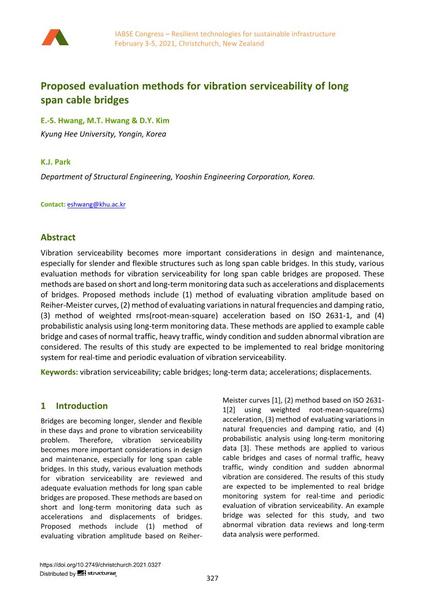Proposed evaluation methods for vibration serviceability of long span cable bridges

|
|
|||||||||||
Bibliografische Angaben
| Autor(en): |
E.-S. Hwang
(Kyung Hee University, Yongin, Korea)
M. T. Hwang (Kyung Hee University, Yongin, Korea) D. Y. Kim (Kyung Hee University, Yongin, Korea) K. J. Park (Department of Structural Engineering, Yooshin Engineering Corporation, Korea.) |
||||
|---|---|---|---|---|---|
| Medium: | Tagungsbeitrag | ||||
| Sprache(n): | Englisch | ||||
| Tagung: | IABSE Congress: Resilient technologies for sustainable infrastructure, Christchurch, New Zealand, 3-5 February 2021 | ||||
| Veröffentlicht in: | IABSE Congress Christchurch 2020 | ||||
|
|||||
| Seite(n): | 327-334 | ||||
| Anzahl der Seiten (im PDF): | 8 | ||||
| DOI: | 10.2749/christchurch.2021.0327 | ||||
| Abstrakt: |
Vibration serviceability becomes more important considerations in design and maintenance, especially for slender and flexible structures such as long span cable bridges. In this study, various evaluation methods for vibration serviceability for long span cable bridges are proposed. These methods are based on short and long-term monitoring data such as accelerations and displacements of bridges. Proposed methods include (1) method of evaluating vibration amplitude based on Reiher-Meister curves, (2) method of evaluating variations in natural frequencies and damping ratio, (3) method of weighted rms(root-mean-square) acceleration based on ISO 2631-1, and (4) probabilistic analysis using long-term monitoring data. These methods are applied to example cable bridge and cases of normal traffic, heavy traffic, windy condition and sudden abnormal vibration are considered. The results of this study are expected to be implemented to real bridge monitoring system for real-time and periodic evaluation of vibration serviceability. |
||||
| Stichwörter: |
Beschleunigungen Verschiebungen
|
||||
